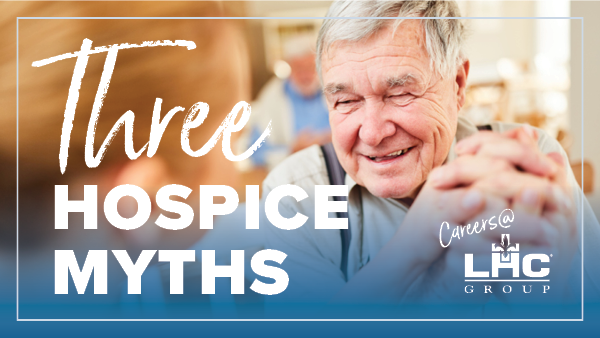Hospice and palliative care is a fulfilling and rewarding career. Unfortunately, there are many commonly held misconceptions surrounding this sector of healthcare that too often misinform professionals who might consider seeking a career path. We’re here to shed some light on a few of the most misunderstood aspects.
As we celebrate National Hospice and Palliative Care Month, we interviewed three members of LHC Group’s hospice leadership team with a combined 80 years of experience in the field: Carla Davis, senior vice president – hospice operations, Lori Stagg, vice president – hospice operations, and Dana Foreman, division president of operations – hospice.
Their insights and wisdom will help demystify the profession and highlight just how important and impactful it really is within the continuum of healthcare. If you’re considering a career in hospice and palliative care – or if you’re just curious – we hope their words will help bring you clarity.
Misconception 1: Hospice Work is Depressing
Carla combats this myth by pointing out how hospice and palliative care professionals are blessed to help empower patients to live life on their own terms, even in their final moments.
“Rather than focusing on the end of life, hospice teams prioritize the quality of life for patients,” she said. “They facilitate meaningful and enjoyable experiences, such as fulfilling last wishes like hot air balloon rides or attending a grandchild’s football games. Hospice is about celebrating life and making each moment count.”
Lori points out the meaningful work involved in guiding patients and their families through tough times.
“As a hospice team member, you are entrusted with managing one of the most important parts of someone’s end-of-life journey,” she said. “That is a huge responsibility, but also a very rewarding role to have.”
Misconception 2: Not Everyone Can Work in Hospice
Dana points out that there are different ways hospice and palliative care professionals can use their abilities.
“LHC Group’s hospice program encourages employees to use their unique talents and skills in many ways to positively impact the community,” she said. “It’s a place where every team member belongs, contributing to a shared mission of providing peace, grace, and understanding during the final days of someone’s life.”
Lori offers this advice to those considering the field of work:
“Part of the orientation process should involve education and conversation about your outlook – explore your own feelings about death and dying,” she said. “It’s important that you get to know patients as individuals, beyond their medical conditions. It’s about listening, understanding, and providing support during a critical phase of life.”
Carla believes that if a person is drawn to or curious about hospice and palliative care, they already possess what she calls a “hospice heart.”
“This career chooses individuals who have a genuine passion for helping others during vulnerable times,” she said. “Visiting patients’ homes during their most challenging moments is an honor and a blessing. A career in hospice is about compassion, empathy, and making a difference in people’s lives.”
Misconception 3: Hospice Workers Lack a Supportive Team
Dana emphasizes that working in hospice and palliative care is not a lonely endeavor. In fact, it’s a calling that nourishes a deep sense of belonging.
“Our teams can trust that we will provide all the resources they need to successfully care for their community, while caring for themselves as well,” she said. “The hospice team becomes a family, supporting one another through both rewarding and challenging times. They share in the grief of losing patients and come together for memorial activities to honor their memory.”
While hospice and palliative care can be emotionally challenging at times, Lori says it’s important to also remember how incredibly rewarding it can be.
“You not only become a part of our team, but you are also part of our family,” she said. “We support each other through many difficult and challenging times. Our teams make a huge positive difference in the lives of the patients and families we care for. We are the team that helps them solve problems and find answers and support.”
As you can see, hospice and palliative care is not defined by the common misconceptions that might deter potential candidates from exploring a career in this field. It’s about celebrating life, making a meaningful impact, and being part of a supportive and caring team.
As we celebrate National Hospice and Palliative Care Month, we hope these insights from Carla, Lori, and Dana will inspire you to consider a fulfilling and rewarding career in this profession. It’s a calling that provides purpose, satisfaction, and the opportunity to make a difference in people’s lives each and every day.
Ready to take the next step in your career? Discover more about the meaningful careers LHC Group offers.


0 Comments